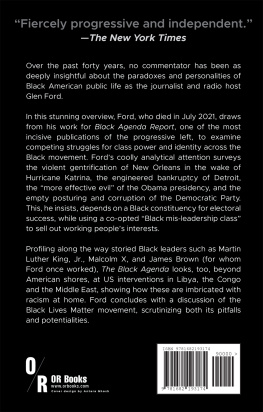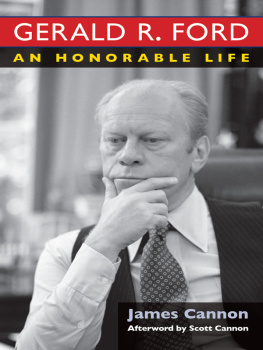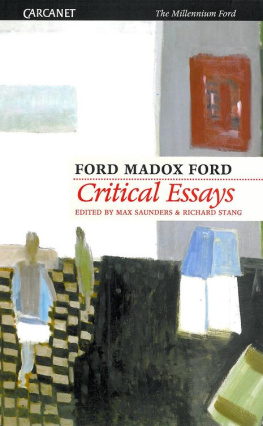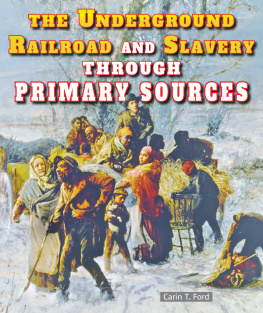THINKING THROUGH CRISIS

Fordham University Press gratefully acknowledges financial assistance and support provided for the publication of this book by Occidental College.
Earlier versions of the Introduction, were published in Rethinking Marxism, Novel, and Cultural Critique.
Copyright 2020 Fordham University Press
All rights reserved. No part of this publication may be reproduced, stored in a retrieval system, or transmitted in any form or by any meanselectronic, mechanical, photocopy, recording, or any otherexcept for brief quotations in printed reviews, without the prior permission of the publisher.
Fordham University Press has no responsibility for the persistence or accuracy of URLs for external or third-party Internet websites referred to in this publication and does not guarantee that any content on such websites is, or will remain, accurate or appropriate.
Fordham University Press also publishes its books in a variety of electronic formats. Some content that appears in print may not be available in electronic books.
Visit us online at www.fordhampress.com.
Library of Congress Cataloging-in-Publication Data available online at https://catalog.loc.gov.
Printed in the United States of America
22 21 205 4 3 2 1
First edition
To K, To T, To A, To W,
The Lost and The Found
CONTENTS
I have received immense support over the years. During my graduate training at Notre Dame, Ivy Wilson, David Ruccio, and the late Joseph Buttigieg helped me turn my broad ideas into a concrete project. Joe, though I miss our conversations, Im heartened by your influence gracing this entire book. Thanks to Sandra Gustafson, Stephen Fredman, Graham Hammill, Glenn Hendler, Luke Gibbons, and other English faculty for their generosity. Richard Pierce and Dianne Pinderhughes made Africana Studies a second home. Seth Markle, Jessica Graham, and Shana Redmond modeled what cutting-edge scholarship can do.
At Occidental, Deans Jorge Gonzalez and Wendy Sternberg provided funds for my books publication. I have learned so much from Warren Montag, Dolores Trevizo, Leila Neti, John Swift, Sharla Fett, Gretchen North, Amy Lyford, Dan Fineman, Eric Newhall, John Lang, Regina Freer, Movindri Reddy, Amy Tahani, Paul Nam, Kristi Upson-Saia, and Michael Gasper. Thank you, Courtney Baker and Erica Ball, for being institution-builders. Krystale Littlejohn, Ross Lerner, Ainsley Lesure, Kelema Moses, Mijin Cha, Jane Hong, and Zinzi Clemmons have shown me how new faculty can revitalize academic spaces.
The special collections at Tuskegee University, University of Chicago, UMASS-Amherst, and the New York Public Library supported my research. Nahum Dimitri Chandler, Stephanie Leigh Batiste, Brent Edwards, Robin D.G. Kelley, and Fred Moten have been wonderful mentors. This book grew out of a vibrant discourse involving Jill Richardson, Rizvana Bradley, Ashon Crawley, the PRG (Ryan McCormick and Matt Brown), Shadee Malaklou, Regina Bradley, Taryn Jordan, Seulghee Lee, Jarvis McCinnis, Erica Edwards, and many others.
Im most grateful to my family and community. Kwanda, thank you for sharing so many victories with me. Ajana, your courage paved the way. Trinity, may the best in me inspire the best in you. When you returned, I lifted you from the car seat and said, I told you wed get you back. Daddy kept his promise. That will be true for every lifetime. Every. One. I learned to believe in myself because my mother and grandparents believed in me first. To my aunts, uncles, cousins, and now second-cousins: Catch yall in 407. Papa, I still miss you. HD, Denaro, Aaron, Ifeuro, Ikechi, Stuart, Lorme, Zahid, Ravi: Seeing us flourish is a blessing. Baba Amos, Marvin Jackson, Alex Yoo, and Cynthia Keith, thanks for the insights. To Andrew, JD, Ami, Mestre Themba, Adam, CM Versatil, CM Muito Tempo, all of Batuque; the LA Angoleiros, CECA, CM Chorao, CM Jurandir, and Justin Eumeka: Capoeira de Angola mandou me chma . Vamos Vadiar camar!
THINKING THROUGH CRISIS
What matters is the life earned when it plunges into the inexplicable and emerges from it.
DAVID MARRIOTT, HAUNTED LIFE
Black radicalism demonstrates that decisions can be made in undecidable situations, that possibility can be culled from petrification, and that force is not an exclusive property of the privileged. Black radicalism contests the assumption that overwhelming experience necessarily hinders thought and action. The spiritual strivings, the conatus in black life, suggests much more is afoot. The African American saying make a way out of no way is a platitude when it is divorced from the lives and art forms that forged it in racialized, gendered, and classed contexts. When that saying gets restored to those lives, art forms, and contexts, a theory of crisis emerges. Making a way out of no way wrestles with the contemporary persistence of black social death and the insistence of black social life.
That exorbitance makes a theory of crisis elusive. That elusiveness prompts reading to become a self-aware practice producing knowledge in the nexus of visions, blindness, voices, silences, and gestures brought to texts. Self-aware reading means judging the shortcomings one sees in texts but also judging the sight itself. Nonvision is therefore inside vision, it is a form of vision.
Engaging several texts from these fields can provide the critical terminology and central themes for a theory of crisis. The challenge is to employ a strategy of inversion through a stratified, dislodged and dislodging writing that brings low what was high in the irruptive emergence of a new concept, a concept that can no longer be and never could be, included in the previous regime. Western thought cannot venture into any investigation that must bear witness to black suffering. The phrase does not necessarily mean the actual physical or emotional difficulties of recently African-descended populations but refers to the fantasies thrust on them . Such projections stem from an anxiety over losing (access to) the privileges of European Manthe image of thought, affective regime, and institutional impulse of the Enlightenment project in the West. For many, losing political, economic, gender, and racial privileges means becoming black, if black here means falling into utter disrepair, condemnation, dishonor, nonvalue, formlessness, powerlessness, and immorality. The premise of European Man promises that its faithful adherents will never experience such loss or will see their loss redeemed in the end.
This leads to a negative categorical imperativeabove all, dont be black. This projection is so seductive that many will deny the abuse they have undergone in fitting into Eurocentric standards. They will go through rhetorical acrobatics to pull back from their research findings and alter their argumentative direction in fear of getting close to the nonvalue they associate with blackness, as if European Mans definition of blackness is correct, as if blackness really is nothingness, as if the very normality bleeding this group dry will save them.
Thinking Through Crisis covers the writings of Richard Wright, Ida B. Wells, W. E. B. Du Bois, Zora Neale Hurston, and Langston Hughes in the 1930s to illustrate that on the hither side of losing (or never having) Europes privileges lies other forms of living. Blackness is not merely suffering but the life lived in spite of suffering. Black radical artistry in the Great Depression has much to teach us about the second Great Depression that has persisted from Hurricane Katrina to the close of President Barack Obamas second administration.








